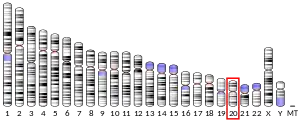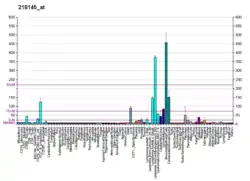TRIB3
Tribbles homolog 3 is a protein that in humans is encoded by the TRIB3 gene.[5][6][7]
Function
The protein encoded by this gene is a putative protein kinase that is induced by the transcription factor NF-kappaB. It is a pseudoenzyme that is thought to be a negative regulator of NF-kappaB, and can also sensitize cells to TNF- and TRAIL-induced apoptosis. In addition, this protein has been reported to negatively regulate the cell survival serine-threonine kinase AKT1.[7] TRIB3 has recently been associated with neuronal signalling, and like TRIB1 and TRIB2, could be considered as a potential allosteric drug target [8][9]
Interactions
TRIB3 has been shown to interact with:
References
- GRCh38: Ensembl release 89: ENSG00000101255 - Ensembl, May 2017
- GRCm38: Ensembl release 89: ENSMUSG00000032715 - Ensembl, May 2017
- "Human PubMed Reference:". National Center for Biotechnology Information, U.S. National Library of Medicine.
- "Mouse PubMed Reference:". National Center for Biotechnology Information, U.S. National Library of Medicine.
- Du K, Herzig S, Kulkarni RN, Montminy M (Jun 2003). "TRB3: a tribbles homolog that inhibits Akt/PKB activation by insulin in liver". Science. 300 (5625): 1574–7. doi:10.1126/science.1079817. PMID 12791994. S2CID 43360696.
- Hegedus Z, Czibula A, Kiss-Toth E (Aug 2006). "Tribbles: novel regulators of cell function; evolutionary aspects". Cell Mol Life Sci. 63 (14): 1632–41. doi:10.1007/s00018-006-6007-9. PMID 16715410. S2CID 24556931.
- "Entrez Gene: TRIB3 tribbles homolog 3 (Drosophila)".
- Eyers PA, Keeshan K, Kannan N (2016). "Tribbles in the 21st Century: The Evolving Roles of Tribbles Pseudokinases in Biology and Disease". Trends in Cell Biology. 27 (9): S0962-8924(16)30178-7. doi:10.1016/j.tcb.2016.11.002. PMC 5382568. PMID 27908682.
- Foulkes DM, Byrne DP, Eyers PA (2015). "Tribbles pseudokinases: novel targets for chemical biology and drug discovery?". Biochemical Society Transactions. 43 (5): 1095–1103. doi:10.1042/BST20150109. PMID 26517930.
- Zhou Y, Li L, Liu Q, Xing G, Kuai X, Sun J, Yin X, Wang J, Zhang L, He F (May 2008). "E3 ubiquitin ligase SIAH1 mediates ubiquitination and degradation of TRB3". Cell. Signal. 20 (5): 942–8. doi:10.1016/j.cellsig.2008.01.010. PMID 18276110.
- Bowers AJ, Scully S, Boylan JF (May 2003). "SKIP3, a novel Drosophila tribbles ortholog, is overexpressed in human tumors and is regulated by hypoxia". Oncogene. 22 (18): 2823–35. doi:10.1038/sj.onc.1206367. PMID 12743605.
- Wu M, Xu LG, Zhai Z, Shu HB (July 2003). "SINK is a p65-interacting negative regulator of NF-kappaB-dependent transcription". J. Biol. Chem. 278 (29): 27072–9. doi:10.1074/jbc.M209814200. PMID 12736262.
Further reading
- Maruyama K, Sugano S (1994). "Oligo-capping: a simple method to replace the cap structure of eukaryotic mRNAs with oligoribonucleotides". Gene. 138 (1–2): 171–4. doi:10.1016/0378-1119(94)90802-8. PMID 8125298.
- Suzuki Y, Yoshitomo-Nakagawa K, Maruyama K, et al. (1997). "Construction and characterization of a full length-enriched and a 5'-end-enriched cDNA library". Gene. 200 (1–2): 149–56. doi:10.1016/S0378-1119(97)00411-3. PMID 9373149.
- Deloukas P, Matthews LH, Ashurst J, et al. (2002). "The DNA sequence and comparative analysis of human chromosome 20". Nature. 414 (6866): 865–71. doi:10.1038/414865a. PMID 11780052.
- Strausberg RL, Feingold EA, Grouse LH, et al. (2003). "Generation and initial analysis of more than 15,000 full-length human and mouse cDNA sequences". Proc. Natl. Acad. Sci. U.S.A. 99 (26): 16899–903. doi:10.1073/pnas.242603899. PMC 139241. PMID 12477932.
- Wu M, Xu LG, Zhai Z, Shu HB (2003). "SINK is a p65-interacting negative regulator of NF-kappaB-dependent transcription". J. Biol. Chem. 278 (29): 27072–9. doi:10.1074/jbc.M209814200. PMID 12736262.
- Bowers AJ, Scully S, Boylan JF (2003). "SKIP3, a novel Drosophila tribbles ortholog, is overexpressed in human tumors and is regulated by hypoxia". Oncogene. 22 (18): 2823–35. doi:10.1038/sj.onc.1206367. PMID 12743605.
- Huang J, Teng L, Liu T, et al. (2003). "Identification of a novel serine/threonine kinase that inhibits TNF-induced NF-kappaB activation and p53-induced transcription". Biochem. Biophys. Res. Commun. 309 (4): 774–8. doi:10.1016/j.bbrc.2003.08.069. PMID 13679039.
- Ota T, Suzuki Y, Nishikawa T, et al. (2004). "Complete sequencing and characterization of 21,243 full-length human cDNAs". Nat. Genet. 36 (1): 40–5. doi:10.1038/ng1285. PMID 14702039.
- Kiss-Toth E, Bagstaff SM, Sung HY, et al. (2004). "Human tribbles, a protein family controlling mitogen-activated protein kinase cascades". J. Biol. Chem. 279 (41): 42703–8. doi:10.1074/jbc.M407732200. PMID 15299019.
- Gerhard DS, Wagner L, Feingold EA, et al. (2004). "The status, quality, and expansion of the NIH full-length cDNA project: the Mammalian Gene Collection (MGC)". Genome Res. 14 (10B): 2121–7. doi:10.1101/gr.2596504. PMC 528928. PMID 15489334.
- Ohoka N, Yoshii S, Hattori T, et al. (2005). "TRB3, a novel ER stress-inducible gene, is induced via ATF4-CHOP pathway and is involved in cell death". EMBO J. 24 (6): 1243–55. doi:10.1038/sj.emboj.7600596. PMC 556400. PMID 15775988.
- Ord D, Ord T (2005). "Characterization of human NIPK (TRB3, SKIP3) gene activation in stressful conditions". Biochem. Biophys. Res. Commun. 330 (1): 210–8. doi:10.1016/j.bbrc.2005.02.149. PMID 15781252.
- Prudente S, Hribal ML, Flex E, et al. (2005). "The functional Q84R polymorphism of mammalian Tribbles homolog TRB3 is associated with insulin resistance and related cardiovascular risk in Caucasians from Italy". Diabetes. 54 (9): 2807–11. doi:10.2337/diabetes.54.9.2807. PMID 16123373.
- Schwarzer R, Dames S, Tondera D, et al. (2006). "TRB3 is a PI 3-kinase dependent indicator for nutrient starvation". Cell. Signal. 18 (6): 899–909. doi:10.1016/j.cellsig.2005.08.002. PMID 16129579.
- Stelzl U, Worm U, Lalowski M, et al. (2005). "A human protein-protein interaction network: a resource for annotating the proteome". Cell. 122 (6): 957–68. doi:10.1016/j.cell.2005.08.029. hdl:11858/00-001M-0000-0010-8592-0. PMID 16169070. S2CID 8235923.
- Matsushima R, Harada N, Webster NJ, et al. (2006). "Effect of TRB3 on insulin and nutrient-stimulated hepatic p70 S6 kinase activity". J. Biol. Chem. 281 (40): 29719–29. doi:10.1074/jbc.M511636200. PMID 16887816.
- Koh HJ, Arnolds DE, Fujii N, et al. (2007). "Skeletal muscle-selective knockout of LKB1 increases insulin sensitivity, improves glucose homeostasis, and decreases TRB3". Mol. Cell. Biol. 26 (22): 8217–27. doi:10.1128/MCB.00979-06. PMC 1636784. PMID 16966378.
This article is issued from Wikipedia. The text is licensed under Creative Commons - Attribution - Sharealike. Additional terms may apply for the media files.




